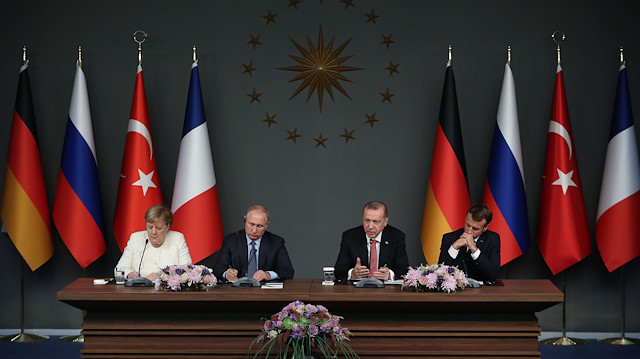
Experts in Turkey view four-nation summit as ‘diplomatic success’
Political experts in Turkey have viewed as a "diplomatic success" the four-nation summit on Syria held in Istanbul.
The summit, hosted by Turkish President Recep Tayyip Erdogan and attended by Russian President Vladimir Putin, French President Emmanuel Macron and German Chancellor Angela Merkel, was held on Saturday.
Speaking to Anadolu Agency, the experts emphasized it was “significant” to take Germany and France onboard to the Sochi agreement signed by Turkey and Russia in September.
Mesut Hakki Casin, a member of Presidential Security Foreign Policy Committee and head of International Relations Department at the Istinye University, said Turkey was perceived as if it had lost its position from the negotiation role on Syria following the July 15th coup attempt.
"On the contrary, Turkey took initiative and responsibility. The rescue of four million human lives is an evidence. While protecting four million people within its borders, Turkey continues to guard four million vulnerable people abroad. If the region is not cleared of heavy weaponry and radical groups, the [military] intervention that Putin hinted during the summit might occur. In this context, the Turkish military presence there carries great risks,” Casin said.
"The most important political decision taken in the summit is to initiate the constitutional process in Syria. It is also noteworthy that all four nations agreed on a political transition instead of military options amid the normalization period," he said.
He went on to say that another important development of the summit was Syria's territorial integrity and sovereignty. "The fact that the U.S. controls 25% of the Syrian soil and arms PKK/YPG along with Israel excludes the U.S. from this process," he added.
"One of the other important points tackled was chemical weapons. I believe that France and the U.S. will re-strike Syria if chemical weapons were used again," Casin said.
Noting that the door leading to Geneva was cracked for the U.S. and Iran, Casin said that this was visible in the messages France and Germany delivered.
Casin underlined that Russian President Putin thanked Turkey for its efforts on clearing heavy weaponry in Idlib.
"However, Putin said that they [Russia] would take side with the regime in case of an attack, indicating that the radical groups didn't lay down heavy weapons and there will be an uncertainty on weapon usage if Russian soldiers are attacked," he said.
"It is important that all parties are committed to the fight against terror and cooperate in intelligence and defense issues. By the way, France and Germany asked Russia to force Assad for peace while Russia demanded money for reconstructing Syria. I believe Europe will provide funding if there is a normalization in Syria," he said.
Turkey drew attention to the east of the Euphrates, which was a direct message to the U.S. Erdogan's Wednesday statement regarding an operation in Eastern Euphrates was Turkey's final say. Turkey implied that it would "enter Manbij just like it entered Afrin."
Ufuk University's Prof. Dr. Sencer Imer, the head of the Political Science and International Relations Department, said that the summit assured that the truce in Idlib would be maintained, a possible refugee influx was prevented and terror movement was averted.
"It is important that all four leaders took a joint decision on the issue of a permanent cease-fire in Idlib. Turkey has clearly expressed that there was a terror threat in most parts of Syria and not just in Idlib. In particular, President Erdogan pointed out that PKK/YPG was still present in northern Syria, or east of Euphrates, posing a threat to Turkey. And, the other leaders raised no objections on this matter," Imer said.
"France and Germany didn't have any objections which indicates that Turkish policies on the eastern Euphrates were acknowledged by other leaders. Hence, it is now a necessity for the U.S. to change policies in the region. This is a significant development," he said.
About the joint decision on establishing a new constitutional commission in Syria, Imer said: "Achieving peace in Syria will only be possible after a new constitution was regulated... Also, we see that the cooperation process that started in Sochi between Turkey, Russia and Iran has reached a new platform following France and Germany's participation [to the 4-nation summit].”
Imer stated that the summit has prepared the ground for a structure that the U.S. and other powers would endorse.
Recalling Erdogan's remarks in which he said Turkey would continue to eliminate elements posing threat to Turkish national security, he said: "It is important that a new conflict-zone doesn't emerge in the world. The world is face-to-face with a nuclear threat. In this respect, for global peace, it is of great importance that the peace in Syria is assured [...] In such an environment where tension escalates, President Erdogan's hint was worthy," he said.
On President Erdogan's statements on informing Iran about the decision hammered in the summit, he said: "This meeting held in Turkey has important and historical reflections on Syria, Turkish borders and the future of the region. This process must absolutely continue. Of course, countries such as the U.S., Iran, Syria, and Iraq should be included in the negotiations somehow.”





